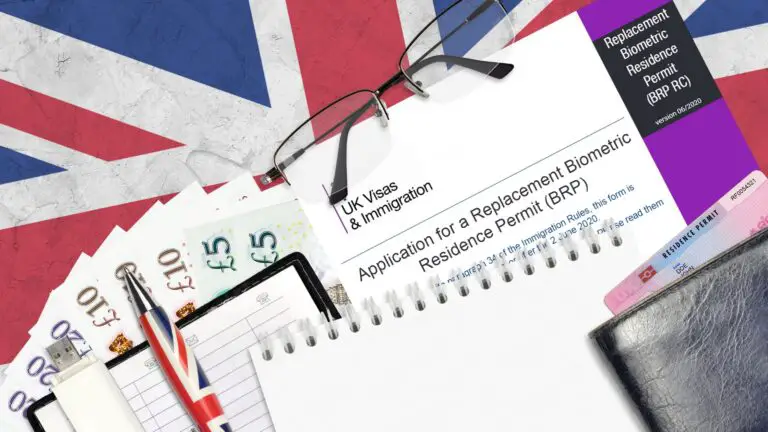To move from America to the UK, you first have to apply for a visa. Americans are not allowed to simply hop off the plane and settle into permanent life in the UK.
I still remember the many, many searches I ran trying to figure out a reasonable way to move from the US to the UK. How do people actually do this, and is there a reasonable route? There’s a lot of bad information out there, and unfortunately not everyone on social media is informed and honest about their situation.
I’ve made this move twice myself, and want to share what I’ve learned along the way. I also keep tabs on the policy changes that swing visa requirements back and forth. So what can you really do if your dream is to move to the UK from America? Let’s take a look at what you need to know to make the move in 2024.
Table of Contents
Is moving to the UK easy for Americans?
To start off honestly, the answer is no. It is not easy to move to the UK from America. That does not mean that there aren’t options that could work for you, but UK immigration policy will not allow you to simply buy a plane ticket and show up for the long-term.
What do I need to stay in the UK long-term?
Most immigrants from the US to the UK arrive on a visa. A visa provides permission for you to live in the country as a non-citizen. The three main routes for visas in the UK are:
- Work
- Partnership/Family
- Study
Your visa will allow you to stay in the country for a set number of years as long as you continue to meet the conditions of the visa. For example, your work visa only remains valid if you stay employed (although you can change employers as long as the new employer still sponsors your visa).
After you pass a certain number of years (usually 5 or 10, depending on the visa), you can apply for Indefinite Leave to Remain (ILR). This is the prize you’re after if you want to be able to stay in the UK without worrying about a visa. ILR lets you live in the UK as a permanent resident (no need to renew) and also includes resident perks, like:
- The right to vote
- Eligibility for public benefits
- The right to apply for UK citizenship after 12 months
It’s a long process to go from new visa-holder to ILR status, so let’s take a closer look at the routes you might take to move to the UK initially.
Moving to the UK on a work visa
Many of us interested in moving to the UK find moving for work to be an appealing route. Doing this can take care of the permission part of moving to the UK, while also taking care of your practical need to keep earning money.

Moving for work is possible with one of these three visas:
- Skilled Worker
- Health and Care Worker
- Senior or Specialist Worker
How to get a skilled worker visa
The skilled worker visa allows you to move to the UK after receiving a job offer from a UK company. You can bring your spouse or partner and minor children with you as dependents. We moved back to the UK in 2021 on my husband’s skilled worker visa. As dependents, my daughter is able to attend school and I am able to work without getting my own work sponsor.
The visa works on a points-based system, and requires that you achieve 70 or more points to qualify. Receiving a qualifying job offer and being a fluent English speaker nets you 50 points.
The final 20 points can be gained from the salary offered, taking a shortage occupation, or having a relevant PhD. For example, if you were offered a Logistics Manager position paying £39,000 per year, this combination would qualify for the final 20 points because the salary is over the going rate for that role and the general salary threshold. More examples and the going rates for eligible occupations can be found on the UK Home Office website.
The UK government has announced that the minimum salary for skilled worker visas will be raised in spring 2024. The new general salary threshold will increase from £26,200 to £38,700. This threshold does not apply to most healthcare workers, education workers, and other shortage occupations.
The salary threshold change made headlines because the current median salary for full-time workers in the UK is only ~£35,000. As with most things related to immigration policy, this may change again in the future as government viewpoints swing. Just like in the US, deciding which immigrants and how many immigrants to allow into the UK is a hotly contested political topic.
How to get a health and care worker visa
If you work in healthcare, there’s a decent chance that your experience would be welcome in the UK. To qualify for this visa, you must have a job offer for an eligible role. Salary requirements for many healthcare employees are set on a national scale, and may be lower than the skilled worker visa requirement. The salary you’ve been offered must be higher than the going rate for your position as shown on the scale.
Another change that’s rattled the headlines is the government’s decision to no longer allow care workers to bring dependents with them to the UK. This change is scheduled to begin in 2024, and will be applied to new visa applicants. There has already been significant pushback given the UK’s need for more qualified healthcare workers, so I wouldn’t be surprised to see changes to this plan.
How to get a senior or specialist worker visa
This was previously called an intra-company transfer visa, which I think was a lot clearer. This option is for companies moving an existing employee from outside the UK to a UK-based office. To qualify as a senior or specialist worker, your job must be on the eligible occupations list and you must earn at least £45,800 per year.
While this may be a good way to test out living in the UK if your employer can make it happen, keep in mind that this visa does not count toward ILR. The visa is really intended for limited time job rotations rather than permanent immigration. You are allowed to bring your spouse or partner and minor children as dependents on this visa.
Can I move to the UK without a job?
I see this question all the time. It’s also not uncommon to see folks on social media talking about how they’re going to spontaneously move to the UK and then sort themselves out once here. Unfortunately, this is not a plan that is going to keep you in good graces with the UK government.
Moving as a tourist
US citizens can travel to the UK without a visa to visit as a tourist for no more than six months. During this time, you are not allowed to work in the country or search for a job. If you did find a company willing to sponsor you on a work visa, you would still need to head back to the US while the visa is being processed.
Overstaying your welcome puts you at risk of being rejected for a visa even if you meet the general requirements. Talk to an immigration lawyer before striding out to the UK sunset without a plan or permission.
Legal ways to move to the UK without a job
With that warning done, there are three UK visas that will let you move here without a work sponsor lined up:
- High Potential Individual (HPI) visa – allows recent graduates from eligible universities, including some top-tier US universities, to live and work in the UK for two or three years. The length of stay depends on the degree you were awarded.
- Global talent visa – requires that you are able to prove yourself as a global leader in academia, arts and culture, or digital technology.
- Innovator visa – requires that you intend to bring a business to the UK that is unlike anything else currently on the market.
The UK also used to offer an investor visa. That visa required evidence of at least £2 million you plan to invest in the UK economy. These visas are now only eligible for renewal. No new applications are accepted.
Moving to the UK on a family visa
You may be allowed to move to the UK to join a partner or family member, and you wouldn’t be alone. In 2022, 3.5 million people living in the UK said that they originally moved to join family. Not every family member will be eligible to sponsor your move, though, so it’s important to know how these visas work.

Which family members are eligible for a UK family visa?
Family visas can be issued to the following relatives of British citizens or people with settled status in the UK:
- Spouses or legal partners
- Parents of minor children (under 18)
- Minor children
- Adults requiring care that cannot be provided in their home country
A fiance can also receive a short-term family visa if you plan to be married within six months of their arrival in the country.
Can I move to the UK with my boyfriend or girlfriend?
There are unfortunately no family visas that recognize informal relationships like boyfriend or girlfriend. If you want to move to the UK to be together, your options are generally:
- Apply for a fiance visa (note you cannot work or study on this visa)
- Get married and apply as a spouse/partner
- Apply for an individual visa like skilled worker or student
How much does my partner need to earn to sponsor my visa?
The minimum income the sponsoring spouse or partner has to show is currently £18,600. However, the government has announced increases to this requirement. An initial announcement had the minimum lifting to £38,700. That announcement got a lot of negative press because the new minimum would be higher than the median UK salary. The change has now been modified to roll out more slowly.
This is the expected timeline for minimum income increases:
- £18,600 – in place until spring 2024
- £29,000 – expected in spring 2024
- £34,500 – expected in late 2024
- £38,700 – expected in early 2025
Can I move to the UK based on my family ancestry?
Some countries will allow you to claim citizenship by descent, or citizenship based on your ancestry. The UK will grant citizenship if one or both of your parents are British and you were born overseas. An ancestry visa (not citizenship) can be considered if your grandparents are British, but this also depends on where you were born and will not be applicable for most Americans. Any British ancestors further back in your family tree won’t help your case.
Can I move to the UK to be near my adult child?
If you have an adult child that has settled in the UK, you might be considering a move yourself to be closer to them. Unfortunately, the UK does not offer a retirement visa or other family visa that would work in this situation.
There is a visa for family members who require daily caretaking. However, this visa requires proof that care is not available or affordable in the home country. You might disagree that healthcare is affordable in the US, but it can be challenging to prove appropriate care cannot be had in the US based on the UK government’s standards. This is a scenario worth discussing with an immigration attorney if you think your personal circumstances could meet the criteria.
Moving to the UK on a student visa
Every year thousands of international students move to the UK to study. Independent boarding schools sponsor child students, while universities sponsor students on undergraduate and graduate degree programs.

The first time I moved to the UK was as a postgraduate studies student. At the time, this allowed me to live in the UK for the duration of my studies plus a few months. I was also allowed to bring my husband and daughter as dependents. Ironically, I had very limited work privileges, but my husband was able to work full-time as a sponsored dependent.
Student visas have changed several times since I held one, so let’s take a high-level look at the current system for university students:
- Your university will need to sponsor your visa – no moving before you’re accepted
- Your visa length will be tied to your programme of study – usually until graduation plus a few months
- You may have to show evidence of finances able to pay for your course and a set amount for living expenses for yourself and any dependents
- You may be able to switch to a Graduate visa after you complete your studies that will allow you to live and work in the UK for a few years without a sponsor (the Graduate visa is currently under review and may be changed or discontinued)
- You can only bring dependents with you if you are on a PhD or research-based graduate degree
Can I work while I study in the UK?
At most, you will be allowed to work no more than 20 hours per week during term time. Some universities and degree programmes may further limit your ability to work depending on their status with the Home Office. Check with the international studies office at your university for an answer specific to you.
Can I bring my family to the UK while I study?
As of January 2024, only students on a PhD or research-based degree are eligible to bring dependents with them to the UK. If you’re considering an undergrad or masters degree, it is unlikely that you will meet the eligibility requirements to bring family with you to the UK.
Can I stay in the UK after I graduate?
Your student visa is likely to expire within a few months of your degree programme finishing. However, you may be eligible to switch to another visa that will allow you to stay in the country.
The most common route is currently the Graduate visa. This visa lets you stay and work in the UK for two or three years (depending on your degree) without a sponsor. This can be extremely helpful because it gives you time to build work experience and professional relationships that could help you land a skilled work sponsor later.
The Graduate visa is currently under review and may be changed or discontinued. The increased income requirements for skilled work sponsorship will also make it more challenging for you to gain the required income level within a few years of graduating. This is really discouraging, but keep an eye out for the inevitable political swings that could modify this again.
How often do UK immigration policies change?
Changes are pretty common in immigration policies. This is a highly charged political topic and the party in charge tends to make policy changes that appeal to their base. Current conservative leadership has taken a hard line approach to immigration, and seeks to cut down on net migration to the country.

The following changes were announced at the end of 2023 (to become effective in spring 2024):
- Health care workers can no longer bring dependant family members with them
- Skilled worker visa applicants must earn at least £38,700 (formerly £26,200)
- The shortage occupation list will be reviewed with a goal to reduce the number of occupations that allow employers to pay below the standard skilled worker salary
- Spouse or partner visa sponsors must show income of £29,000 (formerly £18,600), rising eventually to £38,700
- The Graduate visa programme is under review to decide whether or not to continue offering it as it stands
None of this is great news if you are hoping to move to the UK. However, it’s worth keeping in mind that the country is likely to hold a general election this year. The outcome of the election could shuffle the political view on this subject. It’s also possible that some of these changes would roll back if they don’t build the political energy the current leaders hope for.
Where else can I live in Europe if I can’t move to the UK?
Have I depressed you too much with this look at UK immigration? If you really want to move out of America and have Europe as a general destination, then there are several other countries that you will find more welcoming.
For example, Germany has made recent changes to make it easier for skilled workers to move there. Meanwhile, Portugal and Spain offer digital nomad visas for remote and freelance workers – an option not available in the UK. Keep an open mind and do some exploring beyond the UK before you give up dreaming of life abroad.
What else should I consider before moving to the UK?
Getting permission to move to the UK is a big first step, but you still have a long road beyond that hurdle. These articles will help continue your planning:
How much money do you need to move to the UK?
What do you need to move pets to the UK?
How to find a school for your kids in the UK
Is it worth moving to the UK from the US? Check out the pros and cons













